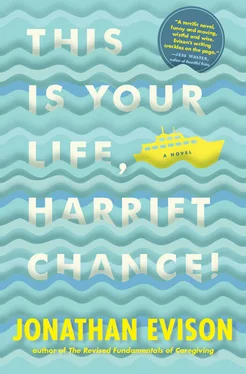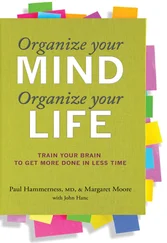On a different day, under different circumstances, Harriet might be delighted. Here she is in Alaska. Think of the gift shops. The gem shops. The native art galleries. But if ever she’s felt like she was going through the motions, it’s now.
Maybe that had been her problem all along, going through the motions. Maybe that’s why she failed to hold Bernard’s attention all those years, or inspire his muse. Maybe her quiet steadiness and her stoic bearing had been dull. Maybe next to Mildred — spritelike, impulsive Mildred — Harriet had looked like a toadstool. And maybe Bernard, under Mildred’s provocative influence, really had been a different man. Surely Harriet had failed to tap Bernard’s potential. She hadn’t pushed him hard enough, hadn’t made him accountable for his flaws. Where Mildred had probably coaxed and challenged and dared Bernard, Harriet had accepted him, warts and all.
Though not a lover of heights, Harriet could use a little perspective. She stands in line for the Mount Roberts Tram. Maybe from the top, her difficulties will look like trifles. The close quarters of the gondola do little to improve Harriet’s discomfort. Nor does the vertiginous drop on all sides as the mountainside falls away. Halfway up, she’s sweating. Her stomach is rising when it should be falling. Pressing her face closer to the window, she forces herself to focus on the little outpost of Juneau below, growing tinier by the minute through the parting fog. Hugging the shoreline along the narrow channel, a flotilla of cruise ships encircles the harbor.
Bernard would have liked this. She can’t help but think it. Such thoughts are second nature. Even the most bitter of grudges cannot deter or distort their appearance. He would’ve liked the cables, the pulleys, the whole of the great gravity-defying apparatus that held them aloft and pulled them forward. He probably wouldn’t have even looked down, but up at the seamless workings of the thing. That she can’t stop seeing the world through Bernard’s eyes, that she can’t stop loving him in the face of his terrible deception, is at once maddening and heartbreaking.
Shuffling off the tram, she’s glad for the air and proceeds not to the gift shop but the viewing area, where she stands off to the side by herself, leaning on the rail for support, gazing down at the scenery through tatters of fog as the line of red gondolas ascend and descend, disappearing beyond the first bluff, then reappearing near the base of the mountain. How is it possible that she can still love him?
The fist in her stomach redoubles. My God, what is she even doing up here? With this hangover, under these circumstances. But even in her weakened condition, she cannot resist the pull of the gift shop.
She walks out forty minutes later, $186 lighter, with no less than four miniature totems, key chains for Caroline and Skip, and a lovely hand-carved Tlingit mask for herself. How refreshing to spend money heedlessly! Caroline is absolutely right: Harriet’s cheap with herself. Starting now, she’s going to spend money where she can. What’s she saving it for? Posterity? How many years has she been wearing this blue overcoat? How many times has she wanted to replace that dingy patio furniture? It’s time to spend money while she can.
On the tram down the mountain, Harriet stands with her back to the window, clutching the handrail with her free hand. She closes her eyes briefly as the car begins its descent.
“That mask was a little pricey, don’t you think?”
She opens her eyes to find Bernard, at forty, standing directly across from her, cheeks sunburned to a crisp, forehead peeling, his nose a triangular blotch of calamine lotion.
“You!” she says.
“I know I’ve got some explaining to do. I tried to warn you.”
“Don’t bother. Really, Bernard. What on earth could there possibly be to say?”
“Maybe you’re right.”
“Go haunt Mildred, why don’t you?”
Bernard winces.
“It serves you right, you know, that sunburn.”
“I know it does. Look, I’m not here to make excuses. It wasn’t you, it was me.”
“Well, that’s a big relief. Here I’ve been beating myself up for pushing you into the arms of my best friend.”
“That’s not what I mean. I mean, some part of me was, well, conflicted. I knew what I was doing was wrong, but somehow—”
“Oh, is this about your ‘troubled heart’? Because I’d be really interested in hearing about this troubled-heart business. Since the Bernard I lived with didn’t have a heart — more of a command center. And what about all this passion Mildred alluded to? The man I lived with was an automaton.”
“She expanded me.”
“While I washed your socks and ironed your slacks. Oh, this is outrageous, Bernard, really.”
“I’m just trying to explain.”
“What’s to explain? It all seem pretty obvious.”
“There were deficits to consider. Needs not being met. And I’m not blaming you, Harriet.”
“I should say there were needs not being met! All those years, I never even had time to think of my own needs, and yet somehow you had time to go fulfill yours with somebody else.”
“I was incredibly selfish.”
“Just tell me, what was so bad about me, Bernard? Was I a bad lover? Was I too boring? Not impulsive enough? Because if that’s the case, you might have said something before you went and had an affair for nearly four decades. You might have at least given me a chance to punch up my personality — dye my hair, read the Kama Sutra, something. Since when were you impulsive, anyway? You spent half your life with your face buried in a crossword.”
“I hate crosswords. That’s the thing of it. I just can’t stop doing them.”
“So you were hiding, is that it?”
“I suppose that’s one way of looking at it.”
“You took me for granted, Bernard, that’s another.”
“I got my punishment, though, in the end. In a way, you sort of exacted your revenge without ever knowing it, if you really start thinking about it.”
Ashamed, Harriet turns partway toward the window as the tram clears the bluff and the ground falls away abruptly.
“I see,” she says. “You’re trying to strike some kind of bargain, is that what’s happening?”
“I take full responsibility — for Mildred, too.”
“Oh, is that so?”
“She tried to stop it, Harriet. Continually, she tried to stop it.”
“Don’t you dare defend her.”
“She always thought the world of you,” said Bernard. “And don’t think for a minute that she didn’t feel terrible about it, every step of the way. She hated herself and I hated myself. But damnit, Harriet, she loved you, she really did. She understood you so much better than I did. She gave me more practical advice about how to—”
“Stop right there, Bernard. You’re not helping your case.”
“I haven’t got one. Hell, if I were you, I wouldn’t forgive me, either.”
“Then what are you doing here?”
“I’m not sure what I’m trying to accomplish. And that’s the truth. At first, I just wanted to be near you. The Continental was nice, wasn’t it? That’s all I wanted. The familiarity, the companionship, some chicken à la king.”
“Stop,” she says, turning her back on him completely. “Just stop talking.”
Quietly, Harriet simmers as Juneau, its narrow harbor, its dirty little side streets, inches nearer. He’s actually defending her! Unbelievable. Harriet can hardly control her rage. When the tram eases into the station, she turns back toward Bernard, ready to lay into him. But standing in his place is a family of five, eyes painstakingly averted, except for the youngest child, a boy of three or four, who stares unabashedly at Harriet as he empties his juice box with a slurp.
Читать дальше












